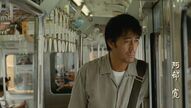Watching it again, still love it. No matter how small the layout and the old story are told by others, and the filming of "Non-Stopping" was filmed again in a different setting, it still accurately poked on the apex of my heart, which can be revisited over and over again. Instead of compressing the story into one day under one roof like "Never Stop", and relying only on the family's words and swords to advance the plot, "Deeper than the Sea" is like a detailed description of the late summer scene that slowly slowed down in everyone's predictions. coming storm. At first the male protagonist is just wandering around - gambling horse racing, stalking, hiding utility bills, negotiating business with clients, relying on alimony with his ex-wife, going to his mother's house to eat old age, which may seem a bit rambling at first glance - but all these sideline details , and finally converged to the night when the typhoon arrived. No longer a family, but still like a family, they crowded in this old and dilapidated apartment that gave them shelter and warmth, listening to the storm outside the window, taking a bath, playing games, and eating curry rice, In forbearance and understanding, he vented his anger and unwillingness towards yesterday.
On the late-night radio station, the legendary singer from the Showa era, Miss Teresa Teng, is singing with all her might - "Deeper than the sea, bluer than the sky, there is no way to love you more"... But the reality is Yes, the ex-wife left behind the cold "You can't live on love alone as an adult" and resolutely decided to remarry someone else. The mother, whose marriage is not happy, has no choice but to face her son in her later years. She can only mutter to herself, not only for her son, but also for herself: there is no ultimate feeling deeper than the sea, but you still need to cheer up Facing my own life - is this the luck or misfortune of ordinary people?
View more about After the Storm reviews











